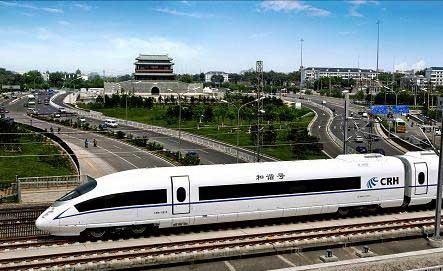| The high-speed railway's impact on intercity bus transport is beginning to manifest itself. Reporters learned from the Zhaogongkou Long-distance Bus Station that the operation of high-speed trains between Beijing-Tianjin has led to a 36.8 percent decrease in bus transport between these two cities since July 2008.
"The number of passengers taking long-distance buses during the Spring Festival period is far less than expected; factors such as the financial crisis, a decrease in the number of migrant workers and severe weather conditions are all secondary reasons for this low number, the major reason is the competition from high-speed trains," said Lu Hui, Vice-Chief of The Zhaogongkou Long-Distance Bus Station.
 |
| Beijing-Tianjin high-speed train |
Although it is close to the peak travel time before Spring Festival, the station only receives around 5000 passengers per day, down by 20 percent from the previous year. According to Lu, the sharpest decline in the number of passengers is on the Beijing-Tianjin and the Beijing-Jinan lines, which used to be major routes for the station, but over 1000 bus passengers have decided to take the train per day since the high-speed passenger-dedicated-line (PDL) began operation.
Statistics show that in 2007, one year before the operation of Beijing-Tianjin intercity railway, the total number of passengers leaving from this station for Tianjin was 523,400 on 27,012 vehicles, while last year, the number of passengers stood at 330,600 and 22,097 vehicles, down by 36.8 percent and 18 percent respectively. The number of passengers decreased more sharply than that of shuttle buses, thus the profit margin was further squeezed. For the Beijing-Jinan line, the number of passengers fell to 69,100 in 2008 from 98,700 in 2007, down by 30 percent while the number of shuttle buses was cut to 3,838 from 4,854, a decrease of 20 percent.
"With a speed of 350Kmh, the high-speed trains are safe and always arrive on schedule, besides, their operation is often immune to bad weather conditions, all these features make it more appealing to passengers than intercity buses," said Yang Chunzhi, Vice General Manager of the National Express (Beijing) Company. All major lines of the company in Beijing, such as the Beijing-Tianjin, Beijing-Shanghai and Beijing-Jinan lines, are currently facing fierce competition from railways, the number of passengers taking long-distance buses in Beijing is expected to see a sharper decrease with the operation of other PDL such as the Beijing-Shijiazhuang, Beijing-Tangshan, and Beijing-Harbin lines, as well as the high-speed line linking Beijing and Shanghai.
Yang suggests that it is an advisable choice for the long-distance bus transport system to avoid direct competition with the "powerful railway transport system." "According to the plan for future development, the long-distance bus transport system will turn to small counties instead of big cities, which are already heavily covered by railway networks. Those small counties might not be the strongest economically, but the travel demands of the people there will be strong enough to support the profitable operation of long-distance buses, meanwhile, it will also be a boon to the local residents who will have access to convenient bus trips and save themselves the trouble of having to buy train tickets in big cities hundreds of kilometers away," said Yang.
Yang goes on to point out that for the bus lines that are already in operation, applying for an extension might be a way to expand their reach. For example, buses from Beijing to Tianjin are allowed to stop at only one station in Tianjin, these buses can apply to stop at more stations so that they can be more appealing to passengers of different destinations.
One practitioner in this industry suggests that, Beijing should pay more attention to the connection between railways, public transit system and the long-distance buses with reasonable planning with regards to the location of stations in order to confront the impact of high-speed railways; and this will also be an effective way of relieving transport pressures by introducing a more convenient transfer network.
Editor: Guo Changdong Source: CCTV |

